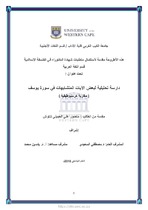| dc.contributor.advisor | Saidi, Mustapha | |
| dc.contributor.advisor | Mohamed, Yasien Alli | |
| dc.contributor.author | Tantoush, Mansour Ali | |
| dc.date.accessioned | 2019-04-15T13:58:43Z | |
| dc.date.available | 2019-04-15T13:58:43Z | |
| dc.date.issued | 2019 | |
| dc.identifier.uri | http://hdl.handle.net/11394/6665 | |
| dc.description | Philosophiae Doctor - PhD | en_US |
| dc.description.abstract | Arabic is the language of the Holy Qur'an, which was revealed to the Prophet Mohammed (may the peace and blessings of Allah be upon him) who in turn dictates it to His companions. The Prophet's companions did not encounter any difficulty in the understanding and comprehension of the Qur‘anic verses simply because the Qur'an was revealed in a language variety with which they have been quite familiar. Yet, the companions of the prophet differ in their understanding of the Qur'an. Their understanding may vary according to their competencies and their closeness to the prophet. In addition, the Qur'an includes verses that appear to be contradictory. Some verses of the Qur'an, for instance, may imply that man is free to select either the path of faith or the path of blasphemy. | en_US |
| dc.language.iso | other | en_US |
| dc.publisher | University of the Western Cape | en_US |
| dc.subject | Qur'an (Sūrat Yūsuf) | en_US |
| dc.subject | Exoteric meaning | en_US |
| dc.subject | Esoteric meaning | en_US |
| dc.subject | Hermeneutics | en_US |
| dc.title | Analysis of selected allegorical Qur’anic verses with specific reference to Sūrat Yūsuf: A hermeneutic approach | en_US |
| dc.rights.holder | University of the Western Cape | en_US |

